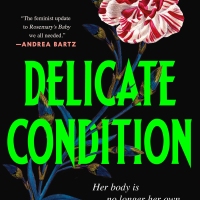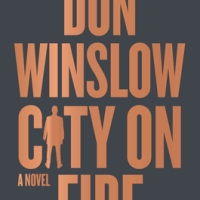Novella Review: We Are All Completely Fine by Daryl Gregory
 We Are All Completely Fine by Daryl Gregory
We Are All Completely Fine by Daryl Gregory
Genre: Horror, Paranormal
Series: Stand Alone
Publisher: Tachyon (August 12, 2014)
Author Information: Website | Twitter
Mogsy’s Rating: 4 of 5 stars
If you recall in my review of Harrison Squared, I described that book as a fun, adventurous mystery which strikes the perfect balance for teen and adult crossover appeal. Well, nothing could be further from my experience with We Are All Completely Fine. Rather, try descriptions like “traumatic”, “disturbing” and “mature audiences only”.
Don’t get me wrong, though; I’ve developed a taste for horror fiction in recent years, and I loved this book. But what surprised me was just how completely different this it from Harrison Squared, which is actually its prequel. In fact, that was what prompted me to pick up We Are All Completely Fine, after finding out how the two books were related, and because I wanted to read more from Daryl Gregory.
The teenaged Harrison whom I first met in Harrison Squared is presently a man in his mid-thirties. Not that he was a jolly personality even at aged sixteen, but as an adult he has become even more gloomy, jaded and world-weary. He’s a famous author now, known for his “Monster Detective” childrens’ stories starring the boy hero from Dunnsmouth named Jameson Jameson, AKA Jameson Squared (things are getting kind of meta here). He’s also seeing a psychiatrist, which is how he eventually landed in a support group with four other members – Stan, Barbara, Martin, and Greta – led by the psychotherapist Dr. Jan Sayer.
Some reviewers have remarked on the strange quirk in the narrative style, specifically how at the beginning of each chapter in this book an unknown narrator appears to be speaking in the first person, though the usage of the pronoun “we” suggests he or she would be part of the support group. However, after a few paragraphs the narration will invariably shift back to the third person. As strange as it sounds, this style immediately brought to my mind the movie The Breakfast Club. Director John Hughes used a slightly different but similar “breaking the fourth wall” technique with voiceover narration at the beginning of the film, explaining to the audience what’s going to happen and why all the characters were there. This creates a kind of “reflection to the past” effect which helps us gain a slightly better understanding. In the case of this book, it tells you that despite the horror that is coming, you know that at least some members of this group managed to survive and come through intact. Well…mostly.
And perhaps comparing this book to The Breakfast Club isn’t so absurd, if you think about it. Instead of five teenagers who have little in common with each other, all trying to fit in amidst the crushing pressures of high school life, you have five likely-insane adults who have little in common with each other, all trying to get by in their normal day lives without the crushing fear of appearing completely unhinged. The characters in The Breakfast Club find themselves in detention, where none of them want to be. The characters of We Are All Completely Fine find themselves in group therapy, where none of them want to be. Despite their differences, the teens in TBC realize they are more than their individual stereotypes, and band together against a common enemy, Principal Vernon. Despite their differences, the strangers in WAACF realize they are more than their individual fucked up pasts, and band together against a common enemy, an ancient all-devouring evil from another world entirely.
All fanciful comparisons to classic 80s movies aside though, this was a fantastic book. It’s the characters that make We Are All Completely Fine – mainly because they are all so completely not. Everyone in Dr. Sayer’s support group is there because they have experienced something terrifying and traumatic…but also unexplainable. No one would believe them if they told their stories of what really happened to them. Unraveling each group member’s mystery is therefore the first step of this hair-raising journey, and my favorite part of the novella. How does Stan handle his minor celebrity status, after being abducted by a family of cannibals a la The Texas Chainsaw Massacre, and emerging as the sole survivor? What message did the Scrimshander leave on Barbara’s bones twenty years ago, when he bound her, drugged her, and carved up her flesh with his knives? Why doesn’t Martin ever want to take off his sunglasses? And Greta, what awful inconceivable secrets must she be hiding behind her silence?
However, the biggest mystery of all – at least to me – was what on earth happened to the Harrison Harrison that I thought I knew from Harrison Squared?
It does make me wonder now, how I would have felt if I hadn’t read that book first before this one. We Are All Completely Fine reveals no major spoilers but does refer to many of the significant events from Harrison Squared, especially those relating to the nightmarish creature called The Scrimshander. It’s made me rethink everything I read in the prequel novel. How much of it was glossed over, played down for “a story for kids?” Mind you, I want to make it clear that reading this in no way diminished my experience with HS, but I am now looking at it in a whole different light. It’s that meta thing again. In a weird trippy way, the two books actually complement each other very well.
Well, now I realize I’ve gone about this review in a very roundabout way. Partly, it’s because I don’t want to spoil too much of the story. We Are All Completely Fine is an average-sized novella, a very quick read, and yet it is just so densely packed with goodness. It just begs to be experienced firsthand. True, it might not be an easy read at times, with its disturbing themes and bone-chilling violence, but I did also find it tremendously addicting. Needless to say, I highly recommend this book and author. It’s a good place to jump on board if you love the horror genre, or if you’re curious about checking out Daryl Gregory’s work. I for one am looking forward to more from his pen.
A review copy of this book was provided to me by the publisher in exchange for an honest review. My thanks to Tachyon Publications!












Thanks for this Now i will have to check out Harrison Squared
LikeLike
You should! Despite starring Harrison as well, it’s quite different from this, but it’s still wonderful 🙂
LikeLike
And now I have another book that I want! Damn it. And thanks 😀
Do I have to read the prequel? Or will this stand alone??
LikeLike
Nope not necessary to read the prequel, this one actually came out first. I read it out of publication order though, because I read Harrison Squared first and liked it so much I had to pick up this one as well 😀
It’s a novella and a quick read, you could probably knock it out in an afternoon 😀
LikeLike
I swear, I could go broke and fill a library/hard drive with all the books you’ve made me want to check out. Here we go again!
LikeLike
You’ll like this one!
LikeLike
Great review! It’s so funny, I’m working on my review of Harrison Squared today, so I’ve been thinking about both books a lot lately. I never would guess that these two books were written by the same author, right? Except for the overlapping characters/events. H2 was just so damn funny, and there is none of the violence and sadness that WAACF has. I’ll tell you one think, Gregory is one of my favorite authors now, and I’m buying a copy of Afterparty next time I order books!
LikeLike
Yeah, that was my thought exactly, and why I was just so shocked – the two books ARE so very different! I loved both though, and I just got the audiobook of Afterparty 😀
LikeLike
I read Tammy’s review of this at Books, Bones & Buffy, and she piqued my interest. After reading your review, I feel like I have to read it. And The Scrimshander sounds like an amazing baddie.
LikeLike
The Scrimshander is terrifying. More so in WAACF but you get a good taste of his evilness too in Harrison Squared.
LikeLike
Oh, I also liked your comparison to The Breakfast Club! You’re right, it’s a very similar type of storytelling.
LikeLike
Looking forward to more is always awesome
LikeLike
I remember reading a lot of high praise for this when it first came out, and I grabbed a copy of it on audible. I listen to the first hour or so, but I have problems with audio books sometimes, and never came back to it. I’d had completely forgotten about until I read you’re review of Harrison Squared. Maybe I’ll go back and try and listen to it again.
LikeLike
Yeah, some people have trouble with audiobooks, I myself took a while to get used to them (and it took several audiobooks). I wonder how this one is in audio format, especially since so much of the experience also depends on the quality of the narrator.
LikeLike
It’s weird, because I listen to an absurd number of podcasts, but when it comes to audio books, unless I have the text in front of me to follow along with, I can’t keep focus.
I forget how the narrator was for it, but I do have INFLUX on audible and have tried listening to it twice (both times only got about 75% through – eventually I just bought the book) but the narrator for that was amazing. So I guess, “It’s not the narrator, it’s just me”
LikeLike
Cool – will add this and H-squared to the TBR list.
LikeLike
I hope you’ll enjoy!
LikeLiked by 1 person
Are you a Hugo voter? I know a lot of people read this because it had some buzz for that.
LikeLike
Nope, not a Hugo voter, and I might have heard some buzz around this book last time but totally didn’t pay attention to it. Until now, and only after I read Harrison Squared.
LikeLike
Yeah, this one’s definitely darker than Harrison Squared. And I kind of loved it for that. 🙂 I want to read thetwo back-to-back at some point and maybe take notes, because there’s definitely some stuff that Jameson knew about in WAACF that I don’t think gets mentioned in HS, so I get the feeling that there are some continuing adventures down the line.
LikeLike
Oh yes, the two are so different but I loved them both, for different reasons too. I read Harrison Squared and WAACF pretty much back to back and it was quite an experience. I wonder how it would have been if I’d read the two the other way around though.
LikeLike
Yes, I want to read this. 🙂
LikeLike
Pingback: Top Ten Tuesday: Top Ten Favorite Novellas | The BiblioSanctum